-
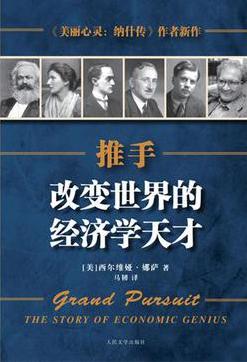
推手
本书以气势磅礴的文字带领我们重温了与经济学家们相伴相生的现代历史。这些经济学天才以某种方式改变了地球上每一个人的生活。书中史诗般的故事讲述了现代经济学是如何产生,又是如何将人类的物质命运从命运手中夺回到了人类自己的手中,并因之将人类从世世代代的含辛茹苦中解救了出来。 娜萨的描述是从查尔斯•狄更斯和亨利•梅休开始的,他们二人对十九世纪中期伦敦穷苦大众的生活状况分别进行了考察和文学描述,而伦敦还是当时全世界最富裕最耀眼的城市。书中还描写了马克思,恩格斯,阿尔弗雷德•马歇尔,比特里斯和西德尼•韦伯夫妇,以及美国的欧文•费雪等人英雄般的勇气和努力,他们都将其思想付诸实践,并为这个世界带来了革命性的变化。 从约翰•凯恩斯到熊彼特,哈耶克,从凯恩斯的门徒琼•罗宾逊,到极具影响力的美国经济学家保罗•萨缪尔森和密尔顿•弗里德曼,还有印度的诺贝尔奖得主阿玛特亚•森,娜萨向读者展示了这些天才的思想是如何改变这个世界的——从伦敦开始,继而是欧洲和美洲的发达国家,直到现在扩展至全球。从娜萨的生动描述中,我们仿佛亲眼目睹了这些经济学家在如何应对他们的个人生活危机,世界战争,革命,经济动荡以及彼此间的分歧,如何回击马克萨斯的理论,并将经济学从悲观的科学改造为一门最终战胜了悲惨而短促的人类宿命的科学。仅仅在两百年之前,这种思想人们尚无法想象。这是一个从反复的失败中寻找解决方案,而最终成就了卓越的历程。 -
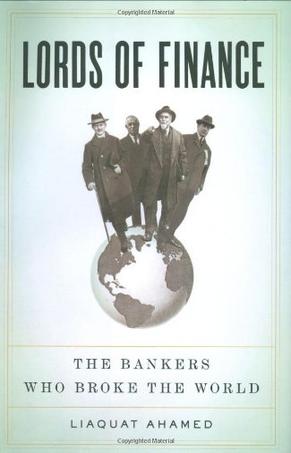
Lords of Finance
As the global economy is racked by its worst crisis since the Great Depression, there is a renewed interest in the lessons to be learned from the world economic collapse of the late 1920s. Drawing on his best-selling book, Lords of Finance: The Bankers Who Broke the World, noted author Liaquat Ahamed discusses the insights we can gain from the Great Depression about the forces that cause global financial crises, the similarities between the breaks down in the 1920s and the current meltdown and the actions economic officials need to take in order to reverse the downward spiral in the world economy and avoid a repeat of that cataclysm. -
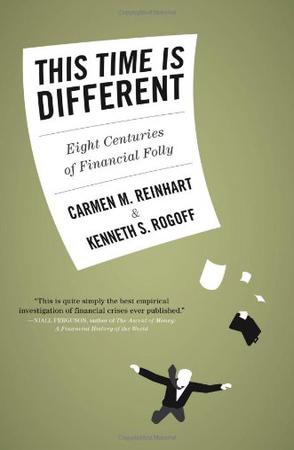
This Time Is Different
The authors use copious amounts of data ... to make the compelling case that any well-informed person should have seen the Great Recession coming. The essence of their book is that while financial crises come in different varieties, they are not mysteriously born of undersea earthquakes, but frequently occurring events that can be spotted and even controlled if politicians and regulators know what to look for. -- Devin Leonard New York Times Reinhart and Rogoff have compiled an impressive database, which covers eight centuries of government debt defaults from around the world. They have also collected statistics on inflation rates from every country where information is available and on banking crises and international capital flows over the past couple of centuries. This lengthy historical study gives what they call a 'panoramic view' of the unending cycle of boom and bust, showing how claims that 'this time is different' are invariably proven wrong... This Time Is Different doesn't simply explain what went wrong in our most recent crisis. This book also provides a roadmap of how things are likely to pan out in the years to come... This Time Is Different is an important addition to the literature of financial history. -- Edward Chancellor Wall Street Journal Professor Rogoff and his longtime collaborator Carmen Reinhart ... know more about the history of financial crises than anyone alive. The pair have just published their broad survey of financial crises, This Time is Different. In an era when most 'analysts' rely on maybe 30 or 40 years' worth of financial history--and then only that of the U.S.--the authors' knowledge of financial crises and government bond defaults going back to the Spanish empire and before offers a richer perspective. -- Brett Arends Wall Street Journal [E]ssential reading ... both for its originality and for the sobering patterns of financial behaviour it reveals. Economist The four most dangerous words in finance are 'this time is different.' Thanks to this masterpiece by Carmen Reinhart at the University of Maryland and Kenneth Rogoff of Harvard, no one can doubt this again... The authors have put an immense amount of work into collecting the data financial institutions needed if they were to have any chance of making quantitative risk management work. -- Martin Wolf Financial Times Everyone working on economic policy should own This Time is Different and open it for a bracing blast of sobriety when things seem to be going well. -- Greg Ip Washington Post [A] fine new history of financial debacles. -- Daniel Gross Newsweek Wouldn't it be nice to have $1,000 for every time a pundit proclaims an era of endless prosperity, consigning booms and busts to the dumpster of history? The next time you hear that canard (and you will) pour yourself a single malt and dip into Carmen M. Reinhart and Kenneth S. Rogoff's landmark study, This Time Is Different. Wherever you open the book, you'll find proof that debt-fueled expansions have ended in financial ruin for hundreds of years... The result is a visual history laid out in beguilingly simple graphs and tables, making the book both definitive--a must read for professors and investors--and accessible to a wider audience. -- James Pressley Bloomberg News Carmen Reinhart and Kenneth Rogoff have delivered a powerful and eloquent statement... Reinhart and Rogoff have done an extraordinary job in putting together statistics on government debt--a task that economic historians should have done long ago but shied away from because of the difficulties of defining 'government', which is often complex and multi-layered. -- Harold James The American Interest Unlike prior narrative accounts of market panics from such finance writers as Charles Kindleberger and Edward Chancellor, Reinhart and Rogoff give us a data-driven study that is global in sweep but also a model of clarity. The authors package their notably nonhysterical analysis of the latest crisis in a large, self-contained section of the book inviting harried readers to skip right ahead to it. -- Daniel Akst CNNMoney.com A tour de force of quantitative analysis covering financial crises affecting 66 countries over the past 800 years, the book identifies pre-crisis patterns that recur with eerie consistency. This Time is Different is a must-read for anyone on the lookout for canaries in coal mines. Barron's This is certainly one of the must-read books of the year. -- Arnold Kling Econlog.com Rogoff and Reinhart ... provide an eye-opening look at the cycles of boom and bust and how governments deal with those cycles. Arkansas Business [A] valuable new book. Idaho Statesman Having studied mountains of economic data during the past eight centuries, the authors insightfully point out the highly repetitive nature of financial crises resulted from a dangerous mix of hubris, euphoria and amnesia. Shanghai Daily -
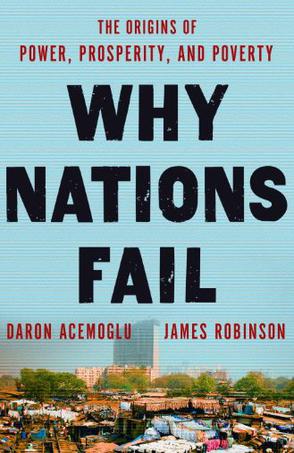
Why Nations Fail
Review "'You will have three reasons to love this book. It's about national income differences within the modern world, perhaps the biggest problem facing the world today. It's peppered with fascinating stories that will make you a spellbinder at cocktail parties - such as why Botswana is prospering and Sierra Leone isn't. And it's a great read. Like me, you may succumb to reading it in one go, and then you may come back to it again and again.' (Jared Diamond, Pulitzer-prize-winning author of bestselling books including 'Guns, Germs, and Steel' and 'Collapse')" ~~~~~~~~~~~~~~~~~~~~~~~~~~~~~~~~~~ Product Description This is a provocative new theory of political economy explaining why the world is divided into nations with wildly differing levels of prosperity. Why are some nations more prosperous than others? "Why Nations Fail" sets out to answer this question, with a compelling and elegantly argued new theory: that it is not down to climate, geography or culture, but because of institutions. Drawing on an extraordinary range of contemporary and historical examples, from ancient Rome through the Tudors to modern-day China, leading academics Daron Acemoglu and James A. Robinson show that to invest and prosper, people need to know that if they work hard, they can make money and actually keep it - and this means sound institutions that allow virtuous circles of innovation, expansion and peace. Based on fifteen years of research, and answering the competing arguments of authors ranging from Max Weber to Jeffrey Sachs and Jared Diamond, Acemoglu and Robinson step boldly into the territory of Francis Fukuyama and Ian Morris. They blend economics, politics, history and current affairs to provide a new, powerful and persuasive way of understanding wealth and poverty. They offer a pragmatic basis for the hope that at 'critical junctures' in history, those mired in poverty can be placed on the path to prosperity - with important consequences for our views on everything from the role of aid to the future of China. -
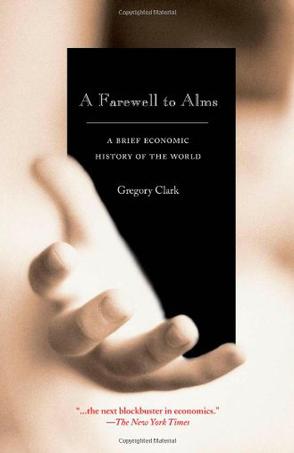
A Farewell to Alms
Why are some parts of the world so rich and others so poor? Why did the Industrial Revolution--and the unprecedented economic growth that came with it--occur in eighteenth-century England, and not at some other time, or in some other place? Why didn't industrialization make the whole world rich--and why did it make large parts of the world even poorer? In A Farewell to Alms, Gregory Clark tackles these profound questions and suggests a new and provocative way in which culture--not exploitation, geography, or resources--explains the wealth, and the poverty, of nations. Countering the prevailing theory that the Industrial Revolution was sparked by the sudden development of stable political, legal, and economic institutions in seventeenth-century Europe, Clark shows that such institutions existed long before industrialization. He argues instead that these institutions gradually led to deep cultural changes by encouraging people to abandon hunter-gatherer instincts-violence, impatience, and economy of effort-and adopt economic habits-hard work, rationality, and education. The problem, Clark says, is that only societies that have long histories of settlement and security seem to develop the cultural characteristics and effective workforces that enable economic growth. For the many societies that have not enjoyed long periods of stability, industrialization has not been a blessing. Clark also dissects the notion, championed by Jared Diamond in Guns, Germs, and Steel, that natural endowments such as geography account for differences in the wealth of nations. A brilliant and sobering challenge to the idea that poor societies can be economically developed through outside intervention, A Farewell to Alms may change the way global economic history is understood. -

A Farewell to Alms
Why are some parts of the world so rich and others so poor? Why did the Industrial Revolution--and the unprecedented economic growth that came with it--occur in eighteenth-century England, and not at some other time, or in some other place? Why didn't industrialization make the whole world rich--and why did it make large parts of the world even poorer? In A Farewell to Alms, Gregory Clark tackles these profound questions and suggests a new and provocative way in which culture--not exploitation, geography, or resources--explains the wealth, and the poverty, of nations. Countering the prevailing theory that the Industrial Revolution was sparked by the sudden development of stable political, legal, and economic institutions in seventeenth-century Europe, Clark shows that such institutions existed long before industrialization. He argues instead that these institutions gradually led to deep cultural changes by encouraging people to abandon hunter-gatherer instincts-violence, impatience, and economy of effort-and adopt economic habits-hard work, rationality, and education. The problem, Clark says, is that only societies that have long histories of settlement and security seem to develop the cultural characteristics and effective workforces that enable economic growth. For the many societies that have not enjoyed long periods of stability, industrialization has not been a blessing. Clark also dissects the notion, championed by Jared Diamond in Guns, Germs, and Steel, that natural endowments such as geography account for differences in the wealth of nations. A brilliant and sobering challenge to the idea that poor societies can be economically developed through outside intervention, A Farewell to Alms may change the way global economic history is understood.